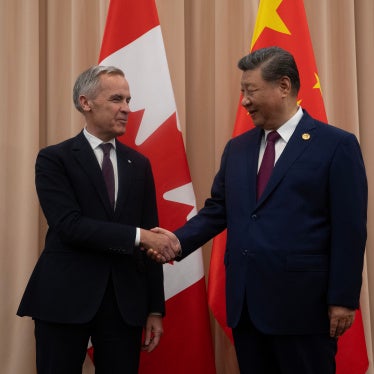(New York) - The Copenhagen Olympic Congress should create a permanent mechanism to monitor human rights in host countries before, during and after Olympic Games, Human Rights Watch said today. Human Rights Watch, which has submitted a proposal to the Congress, is particularly concerned about potential abuses in Russia, host for the 2014 Sochi Winter Games.
The Copenhagen Congress is scheduled for October 3 to 5, 2009, as part of the International Olympic Committee (IOC) Session, from October 1 to 9. Human Rights Watch will present its official proposal for human rights reform within the Olympic Movement at the October 4 session on "good government and ethics."
"The world watched as China trampled on human rights - including throwing people in jail - in the name of preparing for the Beijing Games," said Minky Worden, media director at Human Rights Watch. "That should never happen again, and the Olympic Congress should act now to make sure it doesn't."
A review by the International Olympic Committee said that the 2008 Olympic Games in Beijing were "an indisputable success." But, as Human Rights Watch has documented extensively, Beijing's preparations to host the 2008 Summer Olympics led to the worsening of human rights in China. Thousands of Beijing residents were evicted from their homes to make way for the construction of Olympic venues, with no due process - they were neither consulted nor compensated. Migrant construction workers who built the facilities were required to work under dangerous conditions.
The Chinese government silenced and suppressed rights activists and critics of the Olympics such as Hu Jia and Liu Xiaobo. Many of them remain in prison. The government also imposed stringent media and internet censorship during the games. Censorship of news that the national milk supply was poisoned with melamine may have contributed to causing nearly 300,000 Chinese children to become sick. Six infants died.
"Dozens of Chinese people remain in prison because they took the IOC at its word that bringing the Olympics to China would improve human rights," said Worden. "Instead of celebrating, the Olympic movement needs to come to a reckoning about how it failed to anticipate how human rights abuses could tarnish the Games. And it needs to make sure this doesn't happen again."
In February and April, Human Rights Watch conducted preliminary research on the human rights situation in Sochi connected to preparations for the 2014 Winter Games. This research identified two early problems, which if addressed now, can prevent serious human rights violations: the lack of transparency around expropriating property for Olympic sites, and the conditions for workers building Olympics-related facilities. In May, Human Rights Watch sent the International Olympic Committee a letter outlining these concerns.
Human Rights Watch recommended that in its interactions with the Sochi authorities, the International Olympic Committee insist on a transparent, effective process for property expropriation and compensation, a forum for community input and the expression of grievances, and protection of the rights of construction workers. Absent an official IOC mechanism to make sure these steps are taken to monitor the process, the risk of rights abuses in connection with Sochi's Olympic preparations is considerable.
Human Rights Watch also has expressed its concern to the IOC about the worsening human rights climate in Russia, where several journalists and civil society activists have been murdered since the beginning of the year. They include Natalia Estemirova, a leading rights defender in Chechnya, near Sochi in Russia's Caucasus region. As Human Rights Watch explained in its letter to the IOC on August 28, such rights abuses violate both the spirit and letter of the Olympic Charter, based, as it says, on the "respect for universal fundamental ethical principles."
"During China's Olympics, journalists were threatened and beaten, and human rights defenders were imprisoned," said Allison Gill, Russia office director at Human Rights Watch. "But in Russia, journalists and human rights defenders are being kidnapped and murdered in cold blood. The IOC has both a compelling reason and the influence to tell Russia that there cannot be a successful Olympics when such deadly human rights abuses are occurring."
To address Olympics-related human rights violations in all future host countries, including Russia, Human Rights Watch has proposed creating an IOC standing committee to monitor human rights in host countries. Such a committee would help set and apply human rights benchmarks for potential Olympic hosts, in particular with regard to media freedom, labor rights, freedom of expression and civil liberties. Most important, it would be staffed with experts and tasked with monitoring abuses before, during and after an Olympics. Human Rights Watch has also asked that future Host City Contracts be made public.
"The Olympic Congress represents a rare opportunity for leadership to establish clear and transparent human rights benchmarks for future Games," said Worden. "Just as the 1994 Paris Congress led to vital reforms to respect the environment, we urge the Copenhagen Congress to ensure place in Olympic history with reforms to respect the human environment."






